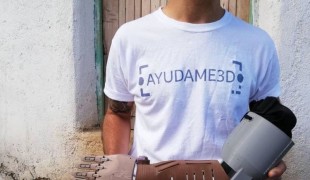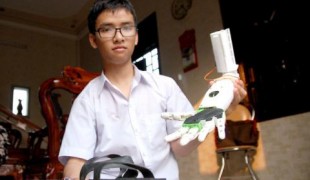- 4460
- 302
- 5
- 3
- 0
- Help Ukraine
About the solution
Project Daniel, founded by Mick Ebeling, CEO of Not Impossible Labs, is an inspiring initiative that focuses on providing 3D-printed prosthetic limbs to children affected by the war in Sudan. The project was born out of Ebeling's deep compassion and determination after he learned about Daniel Omar, a 14 year old who had tragically lost both arms due to a bomb explosion.
Ebeling and his team embarked on a journey to Sudan in 2013, where they met Daniel and employed advanced 3D scanning technology to capture the precise dimensions of his residual limbs. Leveraging their expertise in design and 3D printing, they created a custom-fitted prosthetic arm specifically tailored to Daniel's needs, granting him newfound independence and hope.
But Project Daniel wouldn’t just stop with Daniel. Project Daniel's impact extended beyond individual cases through the empowerment of local healthcare workers. The initiative included building a prosthetics laboratory powered by 3D printers, training programs, equipping these individuals with the skills and knowledge to continue producing and fitting prosthetics for other people in need. This holistic approach underscored the transformative nature of the project, exemplifying the power of innovation, compassion, and social impact.
An essential aspect of Project Daniel is its commitment to an open-source approach. Not Impossible Labs actively embraces the principles of open-source innovation, making their knowledge, designs, and technology accessible to a broader community. By adopting an open-source model, they encourage collaboration, knowledge sharing, and the participation of innovators, healthcare professionals, and patients in the development and improvement of 3D-printed prosthetics. This inclusive approach facilitates customization, accelerates innovation, and fosters a supportive community dedicated to advancing the field.
In summary, Project Daniel, driven by the dedication of Not Impossible Labs and the resilience of Daniel Omar, demonstrates how an open-source approach can revolutionize the field of 3D-printed prosthetics. The combination of 3D printing technology, training local healthcare workers, and the commitment to affordability has made Project Daniel a truly transformative initiative. By sharing their knowledge and resources, they encourage collaboration and enable a wider community to participate in advancing this life-changing technology. The project serves as a powerful example of how innovation, compassion, and open collaboration can transform lives and create a more inclusive future for individuals in need of prosthetic solutions.
Adapted from:
https://www.notimpossible.com/projects/project-daniel
https://www.youtube.com/watch?v=4TeAGKAQJrE
This solution shall not include mention to the use of drugs, chemicals or biologicals (including food); invasive devices; offensive, commercial or inherently dangerous content. This solution was not medically validated. Proceed with caution! If you have any doubts, please consult with a health professional.
DISCLAIMER: This story was written by someone who is not the author of the solution, therefore please be advised that, although it was written with the utmost respect for the innovation and the innovator, there can be some incorrect statements. If you find any errors please contact the patient Innovation team via info@patient-innovation.com



 en
en